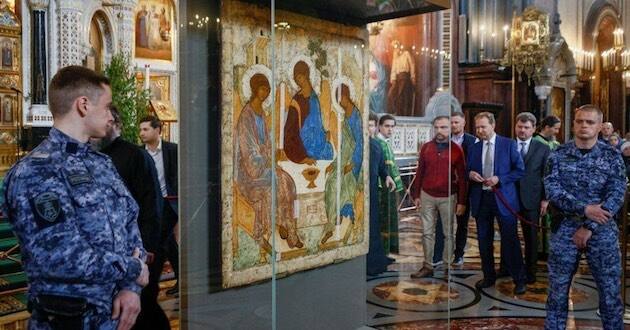Vladimir Putin is placing Russia’s age-old religious art at the service of his war aims.
In Moscow, the Cathedral of Christ the Saviour echoes to Orthodox chants and prayers. It’s packed with worshippers on one of the great feasts of Orthodoxy: Pentecost.
But many have come here to see a masterpiece that’s been put on display. A 600-year-old Orthodox icon – one of Russia’s most precious – believed to have been painted by the medieval artist Andrei Rublev. It’s known as The Holy Trinity.
For a century, this fragile painting has been in a state museum, Moscow’s Tretyakov Gallery. Temperature and humidity controls, along with teams of restorers, have helped to protect and preserve this work of art.
But the Kremlin recently ordered that the icon be transferred to the Russian Orthodox Church. The head of the Church, Patriarch Kirill, is delighted.
READ: The Church Russia built to glorify war
“This icon returns to the Church at a time when our Fatherland is confronting massive enemy forces,” he told worshippers at the weekend. “It returns so that we can ask God to help our country and pray for our Orthodox president Vladimir Putin, whose decision it was to hand back the icon.”
The Patriarch may be pleased. But the icon’s transfer has sparked controversy.
One of Russia’s most renowned art historians agrees to meet to explain why. Lev Lifshits was part of a group of experts that advised against moving the icon from the Tretyakov Gallery, warning that the transfer could result in major damage.
“This decision was someone’s personal whim,” Lev explains. “The [Tretyakov Gallery’s] Restoration Council was categorically against this.
Patriarch Kirill of Moscow and All Russia leads a Holy Trinity service with the Trinity icon, Andrei Rublev’s 15th century artwork, in the Cathedral of Christ the Saviour in Moscow on June 4 CREDIT: Moscow Patriarchate Press Service
“While the icon was in the museum, with a team of restorers, it was like a person in intensive care. It was being monitored round the clock and by the most modern equipment.
“This is a political decision. Those in power here are looking to the heavens and hoping for help from above.”
He [Patriarch Kirill] has previously claimed that any Russian soldiers killed will have their sins ‘washed away.’
Or, at the very least, help from the Church to sustain public support for Russia’s full-scale invasion of Ukraine and for Russia’s president. Patriarch Kirill publicly backs what the Kremlin still calls it the “special military operation.” He has previously claimed that any Russian soldiers killed will have their sins “washed away.”
The head of the Russian Orthodox Church is a vocal supporter of Russia’s full-scale invasion of Ukraine
What’s more, the Russian Patriarch has suggested that President Putin’s reign over Russia had been mandated by God.
“God put you in power so that you could perform a service of special importance and of great responsibility for the fate of the country and the people entrusted to your care,” Patriarch Kirill said last October.
In that sense, returning the Holy Trinity icon could be interpreted as a reward for the Church’s loyalty.
But that may be only part of the story.
“The Church is a very important element of his personal ideology,” believes Andrei Kolesnikov of the Carnegie Russia Eurasia Center. “The inner circle of Putin, and Putin himself, they have an ideology: it is clerical, anti-Western and imperialistic. What is the basis of this ideology? Not Marxism-Leninism as in a previous period of Russian history, but religion.
He’s a religious man. But it’s not about Christianity as such, with real Christian values…
“He’s a religious man. But it’s not about Christianity as such, with real Christian values, because cruelty – this is not Christian values. In that sense Putin is a follower of a very specific kind of religion.”
Outside Moscow’s Christ the Saviour Cathedral in Moscow, worshippers are queuing to see the Holy Trinity icon. Some here are hoping for miracles.
“It’s difficult now with the special military operation,” Valentina tells me. “We are praying for victory.”
“Any sensible person will hope the conflict ends soon,” says Antonina. “I think God will help.”
In Russia the Orthodox Church often paints the war in Ukraine as a “holy war” to make Russians believe that God is on their side. And to make them forget that it was their country that invaded Ukraine.
– By Steve Rosenberg | BBC
Russia Editor, Moscow
Used with permission
